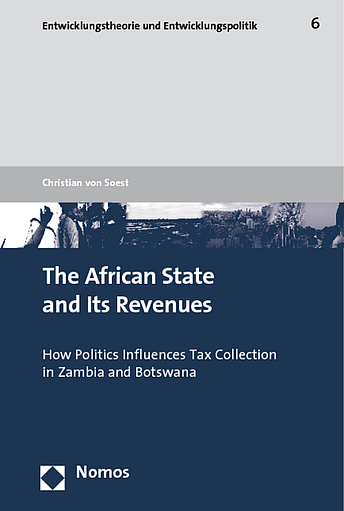englischThe generation of income through tax administration is of central importance for viable statehood as it serves as the basis for all other state functions (e.g., security, public welfare). However, it is precisely this capability to raise revenue which has been a fundamental deficit of African states. More than 50 percent of the tax potential remains untapped; most countries are dependent on development aid. Why is this the case? In order to answer this question this study compares Zambia and Botswana, two countries in Southern Africa. The concept of “neopatrimonialism”, which implies that political interventions and corruption are the core reasons for the existence of weak states, forms the study’s conceptual basis. The analysis finds that the degree of political intervention, corruption and economic development determine the environment of any tax administration. In conjunction with other factors such as development aid they explain the inadequate ability of many African states to finance themselves.
Eigene Einnahmen sind von zentraler Bedeutung für jeden Staat, da sie die Grundlage für alle anderen staatlichen Leistungen bilden (z.B. Sicherheit, öffentliche Wohlfahrt). Jedoch ist genau die Fähigkeit, Steuern zu erheben ein fundamentales Defizit afrikanischer Staaten: Mehr als die Hälfte des Steuerpotenzials wird nicht ausgeschöpft, die meisten Länder sind von Entwicklungshilfe abhängig. Warum? Zur Beantwortung dieser Frage vergleicht die Arbeit Sambia und Botswana, zwei Länder im südlichen Afrika. Als Grundlage dient das Konzept des „Neopatrimonialismus“, das politische Einflussnahme und Korruption als Ursache für schwache Staatlichkeit ansieht. Die Untersuchung zeigt, dass der Grad der politischen Einflussnahme, Korruption und wirtschaftliche Entwicklung das Umfeld der Steuerverwaltung bestimmen. Im Zusammenspiel mit anderen Faktoren wie Entwicklungshilfe erklären sie die geringe Fähigkeit vieler afrikanischer Staaten, Steuern zu erheben.
Die Dissertation wurde mit dem Dissertationspreis der Research Academy Leipzig und dem Nachwuchspreis der Vereinigung für Afrikawissenschaften in Deutschland (VAD) ausgezeichnet.



